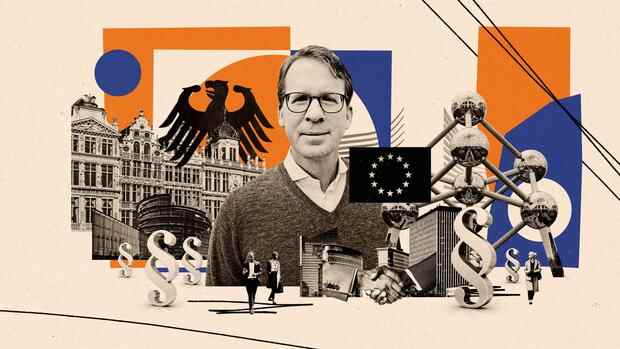Every week, Moritz Koch, head of the Handelsblatt office in Brussels, analyzes trends and conflicts, regulatory projects and strategic concepts from the inner workings of the EU. Because anyone interested in business needs to know what’s going on in Brussels. You can reach him at: [email protected]
When striving for European sovereignty, it pays to start small. Not when building up an EU army of its own, not when appointing an EU foreign minister. But: with double glazing and facade cladding, with better thermal insulation.
That may sound strange, but the math makes sense: almost half of the natural gas that Europe imports is used to heat buildings. And who is Europe’s most important gas supplier? Who decides whether homes in Germany, Italy, Hungary and Austria stay warm in winter? Correct: Russia.
The Russia that is surrounding the Ukraine with an invading army – and that is now making Europe feel what it means politically to be dependent on a revanchist power to provide for its own population.
Energy-efficient houses would not only make an important contribution to climate protection, they would also increase the EU’s scope for action in foreign policy.
Top jobs of the day
Find the best jobs now and
be notified by email.
And: Energy-efficient houses are not castles in the air like most other projects to strengthen Europe’s strategic autonomy, be it the completion of the defense union or even just the abolition of the unanimity rule for foreign policy decisions among the member states.
240 million buildings have foreign policy weight
If one thing has become clear in recent weeks, it is this: the more energy-dependent an EU country is, the less inclined it is to oppose Russian aggression. As long as the Kremlin knows that Russia has what Europe cannot replace, the Western attempts at deterrence with the threat of sanctions are only partially credible. This problem does not require abstract debates, but concrete answers.
A study by the Brussels think tank Bruegel shows how difficult it would be for Europe to replace Russia as an energy supplier in an emergency. The liquid gas, which is currently being shipped to Europe from the USA and Qatar, does alleviate some of the fear of a cold winter.
But according to the experts, it could not fully compensate for a failure in gas supplies via Russian pipelines. Reducing dependency also requires reducing consumption.
The Green Deal, with which the Commission wants to trim the continent to climate neutrality, is almost as important in terms of security policy as it is in terms of environmental policy. It was only in December that the EU presented a legislative proposal, according to which new buildings must be “energy self-sufficient” by 2030, public buildings even earlier, and old buildings by 2050 at the latest.
A single renovation has no effect on the EU’s foreign policy negotiating power or the Kremlin’s strategic calculations – but 240 million buildings, as there are so many in the European Union, do. The renovation obligation, as far-fetched as it may seem at first, would ultimately achieve more than all the summit resolutions and Sunday speeches that have called for the transformation of the EU from market to power in recent years.
More: Geopolitical Prices: We are experiencing inflation like no other
